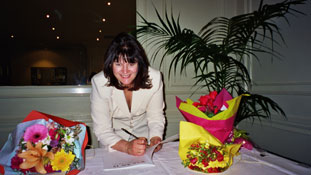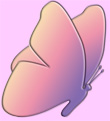Website constructed and edited by Ithika Publishing.
Download a flyer for Ithika's editing and proofreading services.
Yoga At Home with Jane Wiesner Food for Thought Use the 'next' and 'previous' links at the bottom of the page to browse through this site in sequential order. |
 Jane Wiesner signing copies of her book Who Am I? at the 2003 launch. |
'To be or not to be' a friend?
Shakespeare's famous line 'to be or not to be' is something that we decide everyday, one way or another. Every decision we make has an affect on our lives and the lives of those around us. Whether we choose 'to be' a good friend is one of our many choices.
I recently heard of friendship being equated with mathematics, in particular John Nash's Game Theory—i.e. that friendship can be viewed as a commodity. What is exchanged between friends, apart from a whole gamut of emotions, is 'information'. We trust our friends with information about ourselves. We trust them not to use and abuse this information. We share our feelings, our likes, our dislikes, our fears, our failures and our triumphs with a friend. But how our friend deals with this information (and how you deal with this information when someone is sharing their information with you) is the ultimate test of good friendship. If the friend takes the information and uses it against you, then they are not only abusing your trust and rejecting your friendship but they are also not being true to themselves—because they don't demonstrate a sense of honour, or virtue, and honour and virtue are a reflection of self-respect.
Aristotle refers to friendship as a virtue. A virtue is a quality that we can only display if we are truthful with ourselves. When we abuse another's trust it is primarily because we feel fearful in some way—we may fear being that close to someone, we may fear the responsibility of trust, we may fear that they will use something against us so we try to get there first. As I previously touched on in the April 'Food for Thought', fear can cast a shadow over our lives that can limit our ability to feel joy and to be true to ourselves and to others.
In the March 'Food for Thought' I discussed judgement and how our judgement of others (and ourselves) can interfere with our ability to find true happiness and (psychological or emotional) freedom. When we judge someone we are not being a friend. The poem below was something I wrote after walking into a room of strangers and being rejected because of something someone else had said about me long before these strangers had met me (this happened many years ago). These people didn't know me at all, they only knew me through someone else's eyes—yet they judged me and I was given the proverbial 'cold shoulder'.
To truly be kind to yourself and to others, try not to judge them (especially on what other people say about them). Criticism and a judgemental attitude spring from fear and they alter your perception—distort reality, create illusion. Critical Judgement is contrary to the yogic teachings of 'ahimsa' meaning 'non-violence' (you will find an article on ahimsa under 'articles' in this website).
Like children in a playground we may feel compelled to judge (or reject) someone before they have a chance to judge (or reject) us, but this is just our fears talking and we are better than that. The world has so much beauty, wisdom and love to offer us, why 'gossip' in the gutter when, as Oscar Wilde wrote, we could be 'gazing at the stars'.
If you're gazing at anything or anyone with love you are seeing through the eyes of a friend.
Eyes of Judgement
What do you see when you look at me?
If it's hate or envy then you don't see me.
When your eyes meet mine do they simply guess?
Are you just wrapped up in judgement; determined to assess?
Do you have the wisdom to look deeper than the surface?
Is your criticism biased; or do you understand my purpose?
Can you hear my heart; can you see my soul?
Can you really feel my presence; is your vision whole?
Do your eyes see the truth in unadulterated form,
Or, do you simply label me: 'below society's norm'?
Can you feel the hurts; do you sense the fears I've known,
Understand who I am and just how much I've grown?
Does the picture you've created in your captious mind's eye,
Give me colour and focus or do you merely surmise?
What do you see when you look at me—
The truth, or have you made an instant summary?
Jane Wiesner 2000
Yoga teaches us to be kind to ourselves and to others. Try to avoid 'summarising' a person from the outside, they are so much more than what you can see.
Namaste (Saluting the Light in You),
Jane Wiesner
Principal of the Body and Mind School of Yoga
Next month's 'Food for Thought' subject will be 'love'.
Read other issues of 'Food for Thought':


